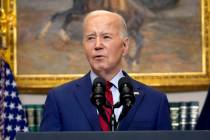EDITORIAL: Paid time off takes a holiday
The city of Henderson has taken some criticism in recent weeks, and rightly so, by getting its financial house in order on the backs of its residents. The municipality is cutting services, increasing fees and might yet raise property taxes, rather than enacting much-needed changes in employee compensation. With the effects of the Great Recession lingering, many of those same residents are still underwater or treading water on the houses and businesses subject to those property taxes.
So it comes as a pleasant surprise that Henderson, in a badly needed display of fiscal sanity, has made a positive step toward addressing its $5 million operating budget shortfall and its $17 million infrastructure deficit. As reported by the Review-Journal’s Arnold M. Knightly on Monday, the city is introducing a new paid time off system for future full-time nonunion employees, a move that is expected to reduce the city’s post-employment payout liabilities by millions of dollars. Those hired after July 1 will have time off payouts at the end of their careers capped at 250 hours. Of the city’s 1,850 full-time workers, 508 are nonunion — but they wouldn’t be affected.
Currently, nonunion full-time employees can amass up to 1,418 hours of unused paid time off (900 hours in sick leave and 518 hours of vacation). As Mr. Knightly reported, many current employees already carry those maximums. When these employees retire, they collect a massive payout roughly equal to two-thirds of their annual salary. For example, a maxed-out employee who is paid about $100,000 annually would get a $66,000 bonus on the way out the door — a nice windfall on top of a guaranteed lifetime pension.
Given the number of Henderson employees who are paid that much and more, these payouts have become unwieldy, often running into high five figures and even six figures. A policy that allows the accrual of massive amounts of paid time off incentivizes the whopping payout, rather than use of the benefit — particularly sick leave. To wit, Henderson has a liability of $36.1 million in accrued sick leave and vacation pay among its 1,850 workers.
The private sector for years has been limiting the accrual of paid time off, as well as 401(k) matches and other benefits, to preserve jobs and keep companies in business. And these changes take effect immediately, for current workers, not just for future hires. Paid time off is supposed to be a quality of life benefit. In the public sector, it has become a deferred compensation program to help government employees amass wealth upon retirement. Local governments, at taxpayer expense, provide more time off than employees can possibly use. It’s brutally unfair to reduce services and potentially raise taxes on the public, while forcing them to provide costly benefits that have disappeared from the private sector.
Henderson deserves kudos for taking this initial, albeit nominal, step that Assistant City Manager Fred Horvath says will save the city as much as $21.7 million in the decades ahead. It’s a small way to address the overall unsustainability of the city’s pay structure without nicking the taxpayers again.
Every other local government has this very same problem and should follow Henderson’s lead. And the city needs to build on this policy by negotiating its inclusion in contracts with each of its six unions, whose current bargaining agreements expire June 30. That would show a much stronger commitment to fiscal sustainability.























